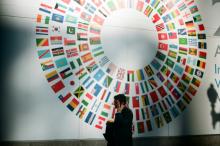While the positive contributions of migration to development are well-recognised following the mainstream idea that migration is a tool for economic growth and poverty alleviation, some scholars maintain that irregular migration is unlikely to have positive development effects and that migrants with irregular status are restricted in their capacity to be agents of development. This dissertation re-examines this view and addresses the research question: How and via what strategies do migrants achieve human development in the context of irregular status?
Interview data from 176 Filipino migrants and 36 key informants were thematically analysed, supplemented by a review of relevant academic literature and policy documents and formal and informal consultations with other stakeholders, including policymakers at the local and national levels. The analysis of the data supports the conclusion that irregular migrants deploy various interrelated strategies to achieve certain functionings that reflect their ability to overcome limitations and to realise a certain level of human development.
Human development is a broader conception of development that is about people having the capabilities to achieve valuable functionings or, in simpler terms, to be able to do things they want to do and to be the persons they want to be in accordance with their aspirations and own conception of a good life. The four empirical papers that comprise the dissertation discuss different yet complementary strategies for human development, calling attention to the capacity of irregular migrants for agency and transformation and, at the same time, underscoring the constraints that prevent them from achieving their full development potentials.
About the author:
Lalaine Siruno has a bachelor’s degree in Philosophy (magna cum laude) from the University of the Philippines – Diliman, a double master of arts in Applied Ethics from Linköping University and Utrecht University, and a master of science in the Governance of Migration and Diversity (Sociology track) from Erasmus University Rotterdam. From South Holland, she moved to South Limburg to pursue a PhD at UNU-MERIT/Maastricht University, where she has also been teaching, supervising and mentoring students. Since 2022, she has also been actively involved in the Horizon Europe MIrreM Project (Measuring Irregular Migration and Related Policies). She continues her academic journey as a post-doctoral researcher at UNU-MERIT/Maastricht University.


